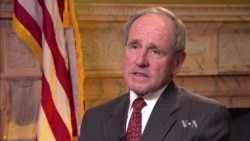In what could be a preview of the kind of foreign policy debates that will feature in the U.S. presidential race later this year, a senior Republican member of the Senate’s Foreign Relations Committee has strongly criticized the Obama administration’s policy toward Russia.
In an interview with VOA’s Georgian service, Senator James Risch from the western U.S. state of Idaho said the economic sanctions the United States imposed on Russia for its annexation of the Black Sea peninsula of Crimea and support for separatists in eastern Ukraine have been insufficient.
"Well, I think to some degree they’re working, but 'some degree' really doesn’t cut it," Risch said. "You need to get to a much stronger position then where we are. So, my view would be that we ought to ratchet that up.
"I think the U.S. and other countries have a lot of experience with sanctions and how they work and it seems that we could be doing more than what we’re doing. And I think that would be very helpful – to try to get the attention of the Russians, and get them to understand that we are very serious about their adventurism and the things they’ve been doing in recent years," he said.
Western sanctions
Since Russia annexed Crimea from Ukraine in early 2014, the U.S. and European Union have imposed several rounds of sanctions targeting Russian officials and entities, along with Russia-backed Ukrainian separatists. The sanctions include asset freezes and travel bans.
WATCH: Senator James Risch criticizes US policy toward Russia
Risch said the lack of a tough Western response to Russia’s invasion of Georgia in 2008 emboldened President Vladimir Putin and led to Moscow's subsequent military moves in Ukraine and Syria.
"Unless someone does something, you can expect the same thing to happen over and over again. That's what history teaches us," he said.
"And that’s exactly what happened here – there were essentially no sanctions for what Russia did, and as a result of that, why would they hesitate when they look at Crimea, when they look at Ukraine, or anywhere else," Risch said.
"They’re absolutely convinced, particularly with the administration we have, which of course is going to change in not too long, they can get away with these things, and get away with them with impunity," he added.
In a recent interview with The Atlantic magazine, President Barack Obama noted that Russia intervened militarily in Georgia in August 2008, when George W. Bush was still U.S. president and the United States still had 100,000 troops in Iraq.
Obama also questioned whether Russia’s subsequent military interventions were a sign of strength.
Ukraine, Syria
"Putin acted in Ukraine in response to a client state that was about to slip out of his grasp. And he improvised in a way to hang on to his control there," Obama said.
"He’s done the exact same thing in Syria, at enormous cost to the well-being of his own country. And the notion that somehow Russia is in a stronger position now, in Syria or in Ukraine, than they were before they invaded Ukraine or before he had to deploy military forces to Syria is to fundamentally misunderstand the nature of power in foreign affairs or in the world generally," the president said.
Real power means you can get what you want without having to exert violence," he said.
Ukraine, Obama added, is a "non-NATO country" that will be "vulnerable to military domination by Russia" no matter what the U.S. does.






